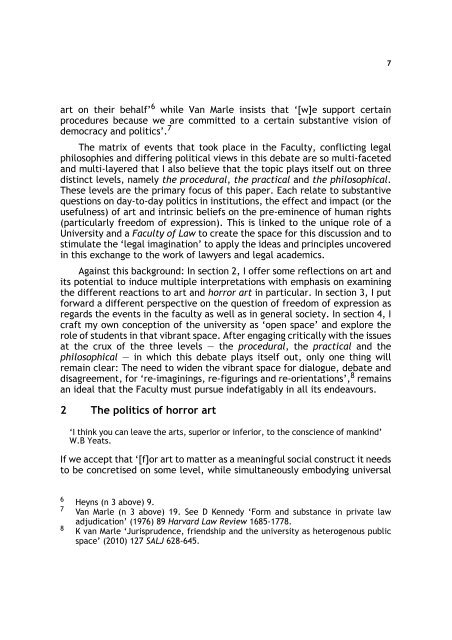Download this publication - PULP - University of Pretoria
Download this publication - PULP - University of Pretoria
Download this publication - PULP - University of Pretoria
You also want an ePaper? Increase the reach of your titles
YUMPU automatically turns print PDFs into web optimized ePapers that Google loves.
art on their behalf’ 6 while Van Marle insists that ‘[w]e support certain<br />
procedures because we are committed to a certain substantive vision <strong>of</strong><br />
democracy and politics’. 7<br />
The matrix <strong>of</strong> events that took place in the Faculty, conflicting legal<br />
philosophies and differing political views in <strong>this</strong> debate are so multi-faceted<br />
and multi-layered that I also believe that the topic plays itself out on three<br />
distinct levels, namely the procedural, the practical and the philosophical.<br />
These levels are the primary focus <strong>of</strong> <strong>this</strong> paper. Each relate to substantive<br />
questions on day-to-day politics in institutions, the effect and impact (or the<br />
usefulness) <strong>of</strong> art and intrinsic beliefs on the pre-eminence <strong>of</strong> human rights<br />
(particularly freedom <strong>of</strong> expression). This is linked to the unique role <strong>of</strong> a<br />
<strong>University</strong> and a Faculty <strong>of</strong> Law to create the space for <strong>this</strong> discussion and to<br />
stimulate the ‘legal imagination’ to apply the ideas and principles uncovered<br />
in <strong>this</strong> exchange to the work <strong>of</strong> lawyers and legal academics.<br />
Against <strong>this</strong> background: In section 2, I <strong>of</strong>fer some reflections on art and<br />
its potential to induce multiple interpretations with emphasis on examining<br />
the different reactions to art and horror art in particular. In section 3, I put<br />
forward a different perspective on the question <strong>of</strong> freedom <strong>of</strong> expression as<br />
regards the events in the faculty as well as in general society. In section 4, I<br />
craft my own conception <strong>of</strong> the university as ‘open space’ and explore the<br />
role <strong>of</strong> students in that vibrant space. After engaging critically with the issues<br />
at the crux <strong>of</strong> the three levels — the procedural, the practical and the<br />
philosophical — in which <strong>this</strong> debate plays itself out, only one thing will<br />
remain clear: The need to widen the vibrant space for dialogue, debate and<br />
disagreement, for ‘re-imaginings, re-figurings and re-orientations’, 8 remains<br />
an ideal that the Faculty must pursue indefatigably in all its endeavours.<br />
2 The politics <strong>of</strong> horror art<br />
‘I think you can leave the arts, superior or inferior, to the conscience <strong>of</strong> mankind’<br />
W.B Yeats.<br />
If we accept that ‘[f]or art to matter as a meaningful social construct it needs<br />
to be concretised on some level, while simultaneously embodying universal<br />
6 Heyns (n 3 above) 9.<br />
7 Van Marle (n 3 above) 19. See D Kennedy ‘Form and substance in private law<br />
adjudication’ (1976) 89 Harvard Law Review 1685-1778.<br />
8 K van Marle ‘Jurisprudence, friendship and the university as heterogenous public<br />
space’ (2010) 127 SALJ 628-645.<br />
7

















